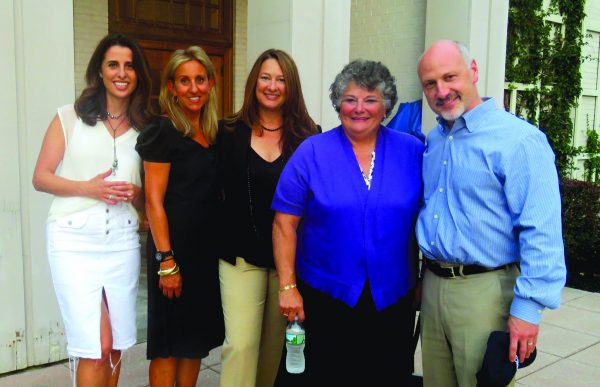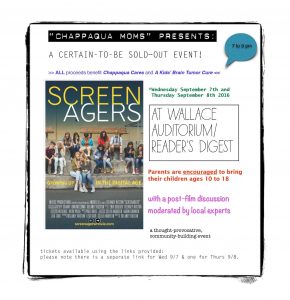 In today’s society we are consumed with screens; whether we are participating in work or leisure activities; children, teenagers, and adults are often engaged with electronics. Childhood activities such as, hopscotch, spud, building forts out of cardboard boxes, and charades have become games of the past. Interpersonal communication as we once knew often ceases to exist. Simple conversation has been replaced by texting and emailing on our laptops, tablets, and IPhones.
In today’s society we are consumed with screens; whether we are participating in work or leisure activities; children, teenagers, and adults are often engaged with electronics. Childhood activities such as, hopscotch, spud, building forts out of cardboard boxes, and charades have become games of the past. Interpersonal communication as we once knew often ceases to exist. Simple conversation has been replaced by texting and emailing on our laptops, tablets, and IPhones.
In September, the documentary Screenagers: Growing Up in the Digital Age was viewed in our community at the Wallace Auditorium located at the former Reader’s Digest headquarters. The Chappaqua Moms group on Facebook brought this dynamic documentary to the New Castle community. The topic of the overuse of screens by today’s children affects most households.
Julie Scott, co-administrator of Chappaqua Mom’s Facebook page, describes this growing problem as an “epidemic.” She expressed concern that “children don’t know how to unplug.”
Delaney Ruston, Assistant Professor and Filmmaker in Residence in the Humanities, Compassionate Care, and Bioethics at Stony Brook Medicine filmmaker of Screenagers: Growing Up in the Digital Age shares similar views. As the filmmaker for Screenagers, she reports that most children are on screens 6.5 hour per day; excluding time spent doing homework. This makes the film relatable to most families.
Bringing the documentary to the Wallace theatre created a central viewing location for the local community. For more information about how technology impacts child development and poses challenges for parents, visit screenagersmovie.com.

Dr. Ruston reports that her two children’s use of screens was her motivation for making the film. At the time that she made the film, they were 12 and 14 and despite attempts to engage them in alternative activities they continued to use screens. Both children were “sneaking screens” even when they were told not to in their household. At this point, she began to look at different methods to curtail their use. As a primary care physician, she began to view it as an addiction. According to Dr. Ruston, “activity on screens affects the nucleus accebens.”
This is the reward circuit of the brain.
When we do anything we consider rewarding; the neurotransmitter dopamine is activated, and this is often what happens to addicts. When we are on screens, dopamine is released and a feeling of enjoyment and pleasure surface and motivates us to continue use.
The problem of screen overuse is a problem that affects families throughout the world. According to Lisa Tabb, co-producer of Screenagers, the documentary has been viewed 1,000 times nationwide and in all 52 states in the United States. The following countries have also had viewings: Australia, Bermuda, British Virgin Islands, Canada, Egypt, France, Hong Kong, Italy, Mexico, New Zeeland, Saudi Arabia, South Africa, South Korea, Spain, Switzerland, Turkey, and the United Kingdom.
As parents, what are some practical solutions to help lessen this problem during everyday use and holidays, when use increases? Delany Ruston, suggests the following:
- Calm, frequent conversations, which open up the ideas of what the child gains from the screens
- Looking at it in as a curious; non-judgmental light
- Parents gradually try to unplug as well, and designate app free-days in the house; instead of total non-use of screens
- Brainstorming what can be done when not texting; such as quality time with family members and reading
- Purchasing items like an alarm clock to encourage less use of the screens and reliance on the phone for alarms
- Focusing more on rewards than punishment
Stephanie O’ Leary, Pys.D, a local child psychologist with a practice in Mount Kiso and mom of two agrees with these recommendations in terms of striking a balance and brainstorming about alternative rewarding activities. In addition to her practice, she writes a blog and facilitates virtual parenting webinars.
On her website, www.stephanieoleary.com, she discusses the challenges of “parenting in the real world,” and specifically addresses concerns about the use of screens among children. She also adds, “to tolerate the fall-out when children are told that there may be some restrictions of time is important.”
Dr. Leary reports in her practice she sees an increase of use during holiday seasons. She recommends a software system to monitor the content of children’s use. A parent can block inappropriate content and apps, as well as restrict mature content sites and certain apps.
She reports utilizing a product called Net Nanny, which worked well with her family. These monitoring systems work across your desktop, laptop, and phone. Dr. Leary agrees with not making it a right and wrong conversation, but having open, non- judgmental conversations, which allow the child and parent to be thoughtful screen consumers.
Donna Abemayor is a local resident and frequent contributor to Inside Chappaqua.
 Chappaqua Moms, a virtual Facebook community which includes over 6,800 members, is thrilled to present its first-ever “live” community event: SCREENAGERS: Growing Up in the Digital Age.
Chappaqua Moms, a virtual Facebook community which includes over 6,800 members, is thrilled to present its first-ever “live” community event: SCREENAGERS: Growing Up in the Digital Age.
